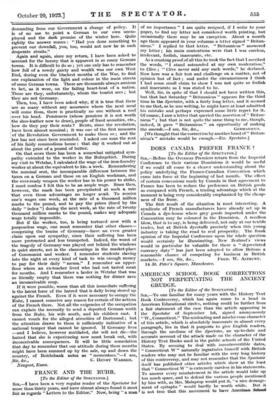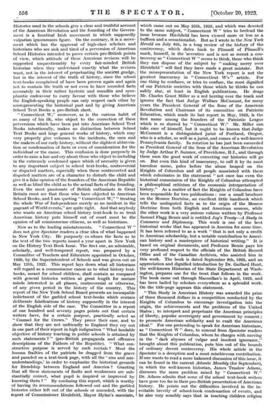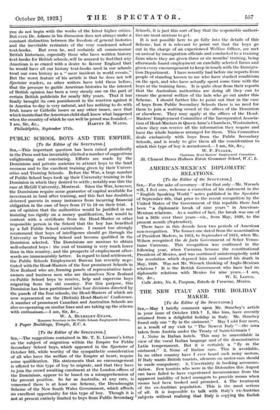AMERICAN SCHOOL BOOK CORRECTIONS NOT PERPETUATING THE ANCIENT GRUDGE.
[To the Editor of the SPECTATOR.] Sin,—To one familiar for many years with the History Text Book Controversy, which has again come to a head in American Educational circles, nothing could be further from a fair statement of the case than the article appearing in the Spectator of September 1st, signed anonymously " W., Connecticut." The misleading and mischievous character of this article, which is absolutely inaccurate in almost every paragraph, lies in that it purports to give English readers, through the medium of the Spectator, an up-to-date and accurate account of the attack made on the character of the History Text Books used in the public schools of the United States. By seeming to deal with incontrovertible dates, " Connecticut W " naturally ingratiates himself with British readers who may not be familiar with the very long history of this controversy, and may not remember that the Spectator itself has published other articles which show at the least that " Connecticut W " is extremely careless in his statements. To answer every misstatement in the article would take up too much space, and to defend the various people mentioned by him with, as Mrs. Malaprop would put it, " a nice derange- ment of epitaphs " would hardly be worth while. But it is not true that this movement to have AMCTilMill. Sehpai
Histories used in the schools give a clear and truthful account of the American Revolution and the founding of the Govern- ment is a fanatical Irish movement in which supposedly vulgarian ignoramuses figure. On the contrary, it is a move- ment which has the approval of high-class scholars and historians who are sick and tired of a perversion of American School Histories intended to prove certain pro-British points of view, which attitude of these American revisers will be supported unquestionably by every fair-minded British historian when they understand exactly what the revisers want, not in the interest of perpetuating the ancient grudge, but in the interest of the truth of history, since the school text-books, complained of have been proven again and again not to contain the truth or not even to have recorded facts accurately in their rather hysteric and maudlin and syco- phantic endeavour to curry favour with those who believe the English-speaking people can only respect each other by misrepresenting the historical past and by giving American School Text Books a pro-British slant.
" Connecticut W," moreover, as is the curious habit of so many of his ilk, who object to the correction of these perversions which have been put into American School Text Books intentionally, makes no distinction between School Text Books and large general works of history, which may very properly give volumes to the incidents, the men and the makers of our early history, without the slightest abbrevia- tion or condensation of facts or even of consideration for the individual or the cause. This confusion is done purposely in order to raise a hue and cry about those who object to including in the extremely condensed space which of necessity is given to any important subject in school text-books, controversial or disputed matters, especially when these controverted and disputed matters are of a character to disturb the child and give it a false opinion of the founders of the American Republic as well as blind the child as to the actual facts of the founding. Even the most passionate of British enthusiasts in Great Britain must see that those who have objected to American School Books, and I am quoting " Connecticut W," " treating the whole War of Independence merely as an incident in the pageant of World events," are quite right. And that anybody who wants an American school history text-book to so treat American history puts himself out of court must be the opinion of all commonsense citizens, as well as historians.
Now as to the leading misstatements. " Connecticut W " does not give Spectator readers a clear idea of what happened in New York City. He purposely co nfuses the facts as to the text of the two reports issued a year apart in New York on the History Text Book Issue. The first one, an admirable, scholarly, and well-tempered report, was prepared by a Committee of Teachers and Educators appointed in October, 1920, by the Superintendent of Schools and was given out on May 12th, 1922. This report lays down what all historians will regard as a commonsense canon as to what history text- books, meant for school children, shall contain as compared with general histories written at great length for mature minds interested in all phases, controversial or otherwise, of any given period. in the history of the country. This report of the New York School Board presents an inescapable indictment of the garbled school text-books which contain deliberate falsifications of history supposedly in the interest of the English side of the case. The Committee in a report of one hundred and seventy pages points out that certain writers have, for a certain purpose, practically acted as " Counsel for the Crown." They prove their case, and to show that they are not unfriendly to England they cry out in one part of their report in high indignation " What laudable objective of history teaching in public schools is attained by such statements ? " (pro-British propaganda and offensive descriptions of the Fathers, of the Republic). " What con- structive purpose is served by such recitals.? Must the human frailties of the patriots be dragged from the grave and paraded on a text-book page, with all the ' sins and mis- understandings,' in order to emphasize the historical grounds for friendship between England and America ? Granting that all these statements of faults and weaknesses are sub- stantially correct, what pupil is inspired or improved by knowing thein ? " By confusing this report, which is worthy of having its recommendations followed out and the garbled histories either left out of the schools or amended, with the report of Commissioner Hirshfield, Mayor Hylan's associate. which came -out on May 25th, 1923, and which was devoted to the same subject, " Connecticut W " tries to becloud the issue because Hirshfield has been viewed more or less as a buffoon and a sensationalist. But as -I wrote in the New York Herald on July 8th, in a long review of the history of the controversy, which dates back to Plimsoll of Plimsoll's mark, himself, in the 'seventies and is not so recent a con- troversy as " Connecticut W " seems.to think, those who think they can dispose of the subject by " making merry over Hirshfield " will find they have made a great mistake. But the misrepresentation of the New York report is not the greatest inaccuracy in " Connecticut W's " article. For one thing he confuses, or tries to confuse, the most dignified of our Patriotic societies with those which he thinks he can safely slur, at least in English publications. He drags Mr. Charles Grant Miller as a red herring over the track and ignores the fact that Judge Wallace McCamant, for many years the President General of the Sons of the American Revolution and Chairman of its committee on Patriotic Education, which made its last report in May, 1923, is the first name among the founders of the Patriotic League which is so slurred by " Connecticut W." Mr. Miller can take care of himself, but it ought to be known that Judge McCamant is a distinguished jurist of Portland, Oregon, who is a scholar, as well as a jurist, and comes of a well-known Pennsylvania family. In rotation he has just been succeeded as President General of the Sons of the American Revolution by Judge Arthur P. Sumner, of Providence, ILL, and through these men the good work of correcting our histories will go on. But even this kind of inaccuracy, to call it by its most harmless name, pales before the abuse heaped on the Knights of Columbus and all people associated with them which culminates in the statement " not once has even the historical commission of the Knights of Columbus attempted a philosophical criticism of the economic interpretation of history." As a matter of fact the Knights of Columbus have been responsible for two publications : one a small brochure on the Monroe Doctrine, an excellent little handbook which tells the undisputed facts as to the origin of the Monroe Doctrine from both English and American sources, while the other work is a very serious volume written by Professor Samuel Flagg Bemis and is entitled Jay's Treaty—A Study in Commerce and Diplomacy. This work is one of the best historical works that has appeared in America for some time. It has been referred to as a work " that is not only a credit to American scholarship, but a notable contribution to Ameri- can history and a masterpiece of historical writing." It is based on original documents, and Professor Bemis pays his very profound respect to the officials of the British Record Office and of the Canadian Archives, who assisted him in this work. The book is dated September 8th, 1922, and an appreciation and dignified introduction by Dr. Gaillard Hunt, the well-known Historian of the State Department at Wash- ington, prepares one for the treat that folloNis in the work. The book came out through Macmillan's in April, 1923, and has been hailed by scholars everywhere as a splendid work. On the title-page appears this statement.
" This Study in American History was awarded the prize of three thousand dollars in a competition conducted by the Knights of Columbus to encourage investigation into the origin, the achievements and the problems of the United States ; to interpret and perpetuate the American principles of liberty, popular sovereignty and government by consent ; to promote American solidarity and to exalt the American
ideal." For one pretending to speak for American historians, as " Connecticut W " does, to conceal from Spectator readers
that the Knights of Columbus, whom he charges with moving in the " dark abysses of vulgar and insolent ignorance," brought about this publication, puts him out of the bounds of ordinary decent controversy. His whole article in the
Spectator is a deception and a most mischievous contribution. If one wants to read a more balanced discussion of this issue, it can be found in the current Atlantic Monthly (for September),
in which the well-known historian, James Truslow Adams, discusses the same problem raised by " Connecticut W."
Dr. Adams admits that some of the school text-book writers have gone too far in their pro-British presentation of American history. He points out the difficulties involved in the in- evitable brevity of school-book condensation of events, and he also very sensibly says that in teaching children religion-
you do not begin with the works of the latest higher critics. But even Dr. Adams in his discussion does not always make a constant-distinction between the freedom of general histories and the inevitable restraints of the very condensed school text-books. But even he, and certainly all commonsense British historians, especially those who have written history text-books for British schools, will be amazed to find that any American is so crazed with a desire to favour England that he would have all our history text-books used in our schools treat our own history as a " mere incident in world events." But the worst feature of his article is that he does not tell Spectator readers, as other writers have told them before, that the pressure to garble American histories in the interest of British opinion has been a very steady one on the part of certain British publicists for nearly fifty years. That it has finally brought its own punishment in the reaction against it in America to-day is very natural, and has nothing to do with Irish issues or Catholic issues or any other issues, save that which insists that the American child shall know what happened when the country of which he can well be proud was founded.—
I
Philadelphia, September 17th.












































 Previous page
Previous page